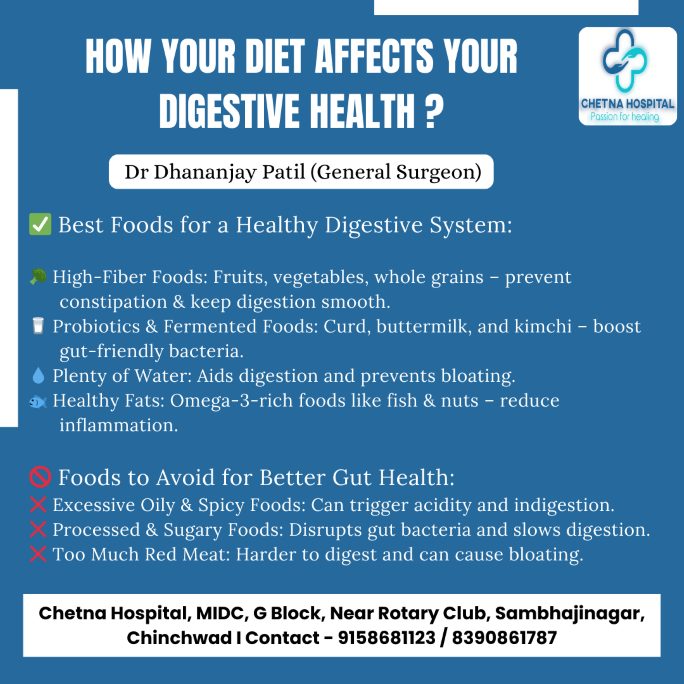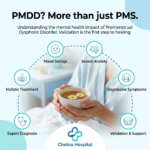Your digestive system is a crucial part of your overall health. It breaks down food, absorbs nutrients, and eliminates waste, ensuring your body functions efficiently. However, what you eat plays a significant role in how well your digestive system operates. A poor diet can lead to issues such as bloating, constipation, acidity, and even long-term digestive disorders. In contrast, a well-balanced diet can promote gut health, prevent discomfort, and improve digestion.
1. Importance of a Healthy Diet for Digestion
A healthy digestive system allows your body to absorb essential nutrients efficiently while keeping gut-related problems at bay. When you consume the right foods, your gut remains balanced, ensuring smooth digestion and optimal health. On the other hand, processed foods, excessive sugar, and unhealthy fats can disrupt gut flora, leading to inflammation and digestive discomfort.
2. Key Nutrients for a Healthy Digestive System
A. Fiber: The Gut’s Best Friend
Dietary fiber is essential for digestion as it adds bulk to stools and promotes regular bowel movements. It also helps prevent constipation and supports gut bacteria. There are two types of fiber:
- Soluble Fiber: Found in oats, beans, apples, and carrots, soluble fiber dissolves in water to form a gel-like substance that aids digestion.
- Insoluble Fiber: Found in whole grains, nuts, and vegetables, this type of fiber adds bulk to the stool and helps it pass smoothly through the digestive tract.
B. Probiotics: Good Bacteria for Gut Health
Probiotics are beneficial bacteria that help maintain gut health. They balance the gut microbiome and aid in digestion. Foods rich in probiotics include:
- Yogurt
- Buttermilk
- Kimchi
- Sauerkraut
- Miso
Including probiotics in your diet can help prevent bloating, gas, and diarrhea while supporting overall gut health.
C. Prebiotics: Feeding the Good Bacteria
Prebiotics are non-digestible fibers that serve as food for probiotics. They help maintain a healthy balance of gut bacteria and improve digestion. Common sources of prebiotics include:
- Bananas
- Garlic
- Onions
- Asparagus
- Whole grains
D. Hydration: Water for Smooth Digestion
Water is essential for digestion as it helps break down food and absorb nutrients efficiently. It also prevents constipation by keeping the stool soft. Drinking at least 8-10 glasses of water daily ensures that your digestive system functions properly.
E. Healthy Fats: Aiding Nutrient Absorption
Healthy fats play a role in digestion by aiding nutrient absorption and reducing inflammation. Sources of healthy fats include:
- Avocados
- Olive oil
- Nuts and seeds
- Fatty fish (like salmon and mackerel)
3. Foods That Harm Digestive Health
Just as some foods promote digestion, others can cause harm. Here are foods that can negatively affect your digestive health:
A. Processed and Junk Foods
Highly processed foods lack fiber and essential nutrients. They are often high in unhealthy fats, sugar, and preservatives, which can slow digestion and cause bloating and constipation.
B. Excessive Sugar and Artificial Sweeteners
Consuming too much sugar can disrupt gut bacteria, leading to bloating and digestive discomfort. Artificial sweeteners like aspartame and sucralose can also cause gut imbalances and digestive distress.
C. Spicy and Oily Foods
Spicy foods can irritate the stomach lining, leading to acidity and heartburn. Excessively oily foods slow down digestion and increase the risk of bloating and indigestion.
D. Excessive Caffeine and Alcohol
Caffeine in coffee and sodas can cause acid reflux and irritation in the stomach lining. Alcohol disrupts the gut microbiome, leading to inflammation and poor digestion.
4. Common Digestive Issues Linked to Diet
Several digestive disorders are directly influenced by diet. Some common conditions include:
A. Acid Reflux and Heartburn
Foods high in fat, caffeine, or spice can weaken the lower esophageal sphincter, allowing stomach acid to flow back into the esophagus, causing acid reflux.
B. Constipation
A diet low in fiber and water leads to constipation. Processed foods and excessive dairy can also contribute to sluggish bowel movements.
C. Irritable Bowel Syndrome (IBS)
IBS symptoms, including bloating, diarrhea, and constipation, can be triggered by specific foods such as dairy, gluten, and artificial sweeteners.
D. Gallbladder Issues
A diet high in unhealthy fats can lead to gallstones, which cause severe abdominal pain and digestive distress.
5. Tips for Improving Digestive Health Through Diet
If you want to improve your digestive health, follow these practical dietary tips:
- Eat More Fiber: Include a mix of soluble and insoluble fiber in your diet to promote smooth digestion.
- Stay Hydrated: Drink plenty of water throughout the day to aid digestion and prevent constipation.
- Consume Probiotic-Rich Foods: Maintain gut balance by eating yogurt, kimchi, and other fermented foods.
- Limit Processed Foods: Reduce intake of sugary, fried, and processed foods that disrupt gut health.
- Eat Mindfully: Chew food slowly and avoid overeating to give your digestive system time to process food properly.
- Reduce Spicy and Oily Foods: If you frequently experience acidity, cut back on spicy, greasy meals.
- Exercise Regularly: Physical activity stimulates digestion and reduces bloating.
6. When to Consult a Doctor
If you experience persistent digestive problems such as chronic constipation, acidity, bloating, or abdominal pain, it is essential to consult a specialist. Ignoring symptoms can lead to severe conditions requiring medical intervention.
At Chetna Multispeciality Hospital, Dr. Dhananjay Patil, General Surgeon, provides expert care for digestive health concerns, from minor issues to surgical treatments.
📍 Chetna Multispeciality Hospital, Sambhajinagar, Chinchwad
📞 For Appointments: [Your Contact Number]
Conclusion
Your diet significantly impacts your digestive health. Eating fiber-rich foods, probiotics, and staying hydrated can keep your gut healthy and prevent digestive problems. At the same time, avoiding processed foods, excessive sugar, and spicy meals can protect your digestive system from discomfort. Making mindful dietary choices ensures a well-functioning digestive system and overall well-being.













